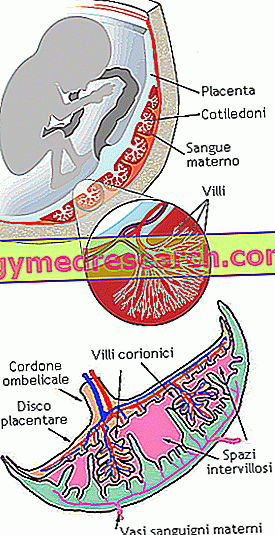Generality
The appearance of pimples in pregnancy is a widespread phenomenon.

There are, in fact, many pregnant women who witness the appearance of these annoying "imperfections" which, more often than not, lead to a real acne.
In a sense, pimples in pregnancy are considered as a normal manifestation that occurs due to the changes taking place in the body of the pregnant woman during this particular period.
However, the treatment of pimples during pregnancy, especially when the manifestation is particularly widespread and severe, could be difficult. This is because, in the prescription of any therapies or treatments it is essential to take into account the relationship between the potential risks for the unborn child and the expected benefits for the mother. Therefore, before undertaking any kind of treatment in case of pimples during pregnancy, it is necessary to contact your doctor.
What are
What are Pimples in Pregnancy?
Pimples in pregnancy are considered a completely normal disorder in this particular phase of a woman's life. However, this does not mean that pimples should appear in every pregnant woman.
The most fortunate, in fact, during pregnancy have a radiant and almost perfect skin, but of course, every woman's body reacts uniquely to the changes that typically occur during this period.
When are pimples manifested in pregnancy?
Generally, pimples in pregnancy appear in the first trimester and then regress spontaneously around the fourth or fifth month. In some cases they can disappear only after the birth of the child; while in other cases they can still regress in the second quarter and then reappear shortly after the birth, in a more or less severe form. Also in this case, therefore, there is a great variability from woman to woman.
Features
How are pimples manifested in pregnancy?
Pimples in pregnancy can manifest themselves in different ways, from the mildest forms to the actual acne forms that create considerable discomfort to the pregnant woman.
Pimples can occur both as solid and reddened lesions ( papules ), as lesions containing pus ( pustules ) and as comedones . The type, number and size of pimples that occur during pregnancy can vary from person to person. Similarly, any symptoms associated with this disorder can also occur with different intensity in each pregnant woman.
Where are pimples manifested in pregnancy?
Pimples in pregnancy can occur in different districts. The site on which they preferentially appear is the face, but it is not certain that they will develop homogeneously. Generally, in fact, pimples in pregnancy tend to focus on the nose, chin and cheeks and sometimes can extend to the neck.
Other areas that may be affected by the appearance of the disorder during gestation are the back and upper arms.
Causes
Causes of Pimples Formation in Pregnancy
The main cause of pimples in pregnancy is to be found in the hormonal changes that normally occur within the pregnant woman's body.
Not surprisingly, the appearance of this disorder usually occurs in the first trimester, a period in which there are noticeable alterations in hormone concentrations compared to normal levels. Alterations that, in turn, stimulate the activity of the sebaceous glands with a consequent increase in the production of sebum. This increase can cause obstruction of the hair follicle which - in addition to filling with sebum - also accumulates cellular debris. This phenomenon of accumulation and obstruction favors the onset of inflammation and the consequent appearance of the pimple.
Furthermore, in many cases the inflammation is accompanied by infections sustained by Propionibacterium acnes .
Did you know that ...
In general, if pimples do not occur in the first trimester, they can hardly appear in the following months. Nevertheless, this probability cannot be completely ruled out.
Risk Factors for Pregnancy Pimples Formation
Unfortunately, it is not possible to predict which women will experience the onset of pimples during pregnancy. However, future mothers may be exposed to a greater risk of developing the disorder:
- They have a mixed or oily skin;
- They have suffered from acne in the past;
- They had a tendency to develop acne and pimples before and during menstruation.
Symptoms
What Symptoms Can Pimples in Pregnancy Cause?
In addition to the typically aesthetic damage, pimples in pregnancy can cause the appearance of some rather annoying symptoms. Fortunately, in most cases, it is not a serious symptomatology.
A typical symptom of pimples in pregnancy, as well as pimples in general, is the itching that can occur shortly before the onset of the disorder. It can sometimes evolve into a pain that is localized to the exact points where the pimples will develop.
However, itching and pain can persist even after the onset of pimples in pregnancy, often associated with redness, swelling and possible irritation due to scratching or rubbing of the affected areas.
Pimples complications in pregnancy
In severe cases, pimples during pregnancy could become complicated, giving rise to real cysts . Should this occur, it is good to ask your doctor for advice about what to do.
Care and Treatment
Possible Cures and Treatments Against Pimples in Pregnancy
Since, as stated in the article, pimples in pregnancy tend to regress spontaneously in most cases, often it is not necessary to intervene with any kind of treatment, but it is sufficient to maintain a good cleaning of the skin .
In the event that the disorder occurs in such a serious form as to constitute a real problem capable of negatively affecting the life of the patient, instead, it is necessary the intervention of the doctor.
However, the treatment of pimples in pregnancy is very difficult, since many of the drugs normally used to fight acne and pimples are contraindicated during gestation. In cases of absolute necessity, the doctor could still decide to prescribe the use of benzoyl peroxide based drugs to the future mother.
However, before taking any drug (even if over the counter) for the treatment of acne and pimples in pregnancy, it is absolutely necessary to seek advice from your doctor and / or your gynecologist.
Natural Products and Cosmetics Against Pimples in Pregnancy
If for the treatment of pimples in pregnancy it is preferable to avoid drugs, the situation changes as regards the use of cosmetic products and natural remedies.
For example, natural cosmetic products, such as creams formulated with plant extracts with an anti-inflammatory and astringent action, can be very useful in situations of this type. Typical examples of plants with the aforementioned properties are the witch hazel and the aloe vera (in particular, the gel).
However, even when using natural products that are applied to the skin, it is always good to pay close attention. In fact, not always "natural" is synonymous with "safe in pregnancy". Therefore, although these products must be used externally, as a precautionary measure, it would be good to always ask the advice of your doctor or your gynecologist, or possibly contact a dermatologist.
Finally, in the treatment of pimples during pregnancy, even the use of cosmetic products with an exfoliating action (for example, masks or creams) could prove useful. Even in this case, however, it would be appropriate to seek the advice of the doctor.
Please note
The web is full of articles that report various remedies of the grandmother for the treatment of pimples in pregnancy. These remedies, however - in addition to not guaranteeing efficacy and even less safety in use - do not take into account the fact that women's skin tends to become much more sensitive and delicate during this period. Therefore, their use could further worsen the inflammation and irritation of a skin already severely tested by acne and pimples. For this reason, the use of such stratagems is absolutely not recommended.
Useful Tips
Useful Tips for Tackling Pimples in Pregnancy
Although pimples in pregnancy tend to regress spontaneously, they can still be a major nuisance for pregnant women who suffer from it. For this reason, the following are some tips that may be useful to counteract, or at least control, the manifestations of pimples during pregnancy.
- Maintain good skin hygiene, particularly in the areas affected by the disorder.
- Use mild detergent products suitable for your skin type.
- After daily cleansing, dry the areas showing the pimples gently, preferably by dabbing and not rubbing.
- Do not excessively cleanse the areas where pimples are present. It is true that it is necessary to maintain a good level of cleanliness, but the excessive cleansing could favor a further increase in the production of sebum, thus worsening the problem of pimples in pregnancy.
- Avoid scratching, scratching, crushing or breaking pimples. In doing so, in fact, it would favor the onset of infections, or their spread if they are already present. Furthermore, such a practice could lead to the appearance of scars.
- Even in case of mixed or oily skin, ensure a good degree of hydration to the skin . In fact, if the skin is dehydrated, it reflexively increases the production of sebum in an attempt to restore normal conditions.
- If you use make-up products, make sure they are not occlusive and comedogenic .
Myths to dispel
Pimples in Pregnancy between Legends and Popular Beliefs
There are numerous popular legends that relate the appearance of pimples in pregnancy to the sex of the unborn child. Of course, these beliefs - often contradictory to each other - are completely devoid of any scientific foundation.
According to some of these legends, a skin characterized by acne and pimples in pregnancy should be an indication that the unborn child will be male; while if the pregnant woman's skin is untouched the baby should be female.
On the contrary, according to other popular legends (particularly widespread in Italy), if the future mother presents many pimples, then a child will be born. This is because, the birth "would steal" the beauty of the mother, thus favoring the appearance of the annoying pimples during pregnancy.



